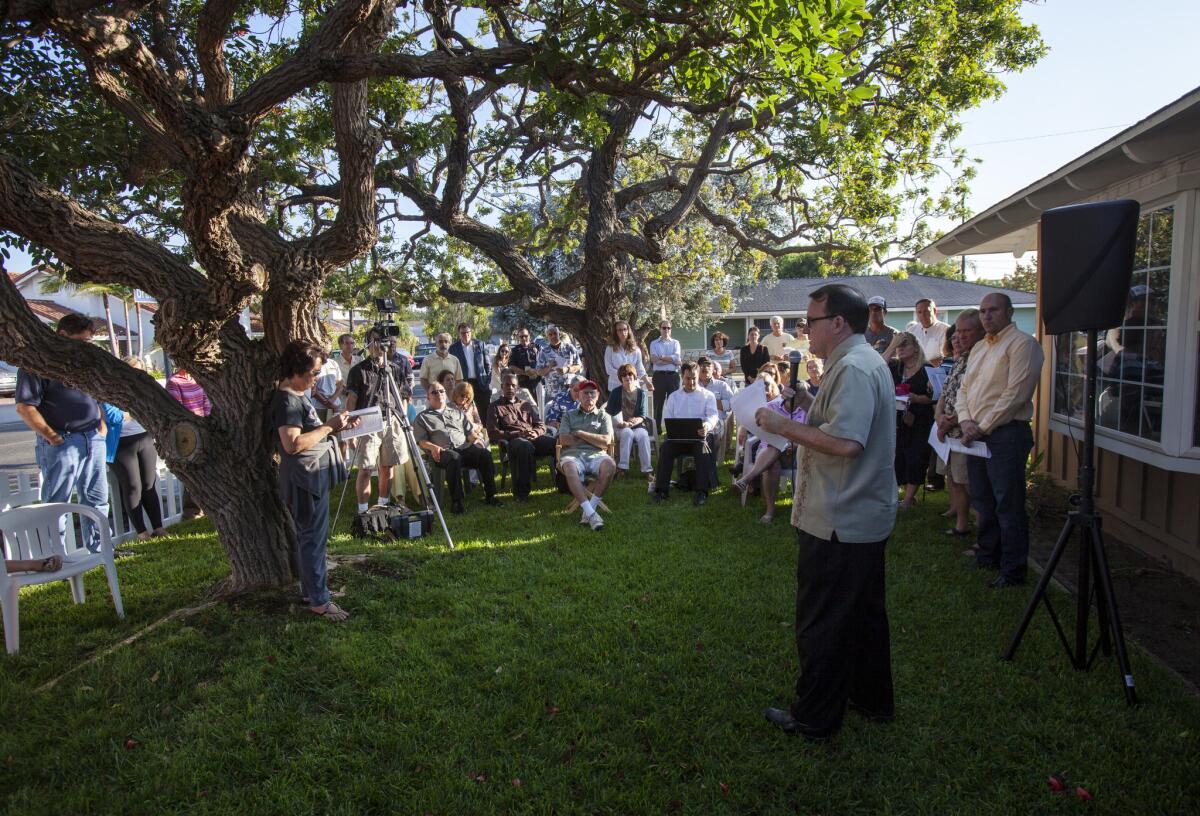Rehab homes discussed at meet-the-mayor event

- Share via
Carrie Renfro says she is negatively affected by three rehabilitation homes in and around her small block in Eastside Costa Mesa.
She and her neighbors feel that the homes have been the source of robberies, syringes left in their yards and passed-out people on their porches.
It’s why she volunteered to host a “meet the mayor” session on her front lawn Thursday evening that brought more than 50 people onto her grass and both sides of her Buoy Street home’s white picket fence.
For more than an hour, Mayor Jim Righeimer and city officials answered questions and talked about the intricate problems and legalities surrounding the homes where people pay to be in a sober-living situation, often to receive treatment for substance abuse.
Righeimer called the issue “uncharted” and “in very strange legal territory.” There are a lot of legal nuances regarding the concentration of homes and aspects about them that could be considered discriminatory, he said.
He said with that in mind, challenges by the city will likely involve costly litigation.
“We need backing, folks,” Righeimer said. “There’s no perfect road here.”
Righeimer said it was important to consider the needs of recovering people, and that the rehab homes must obey the rules.
“We’ve got to start setting some ground rules,” he said, “so that we can make sure people live together in the city.”
Mike Tucker, a city code enforcement officer, said there are 104 known rehab homes in Costa Mesa, about 50 of which have state-issued licenses. None are designated exclusively for seniors.
Southern California, including Newport Beach, is a popular place for rehab homes, Righeimer said, primarily because of the location. They’re also very profitable as a business, he said.
“For a lot of people in the industry,” Righeimer said, “if you’re going to go through a program, would you rather be in Ohio or California?”
Righeimer said there are homes all over the city, even near the Mesa Verde Country Club next to his house. And with some of the treatment centers having many vans transporting their residents around — often because they don’t have cars — and walking around in 25-person groups, they can become problematic, he said.
“That’s just not a neighborhood,” Righeimer said. “That’s not what we signed up for.”
One solution, he said, is creating a registration database that will track rehab home residents. Another is approving the Public Nuisance Abatement Ordinance, which would target behaviors instead of uncut grass or cars parked on lawns. The council examined the ordinance in June and is scheduled to reexamine it again in the coming weeks.
Some Eastside residents who were against rehab homes complained of petty theft, speeding, excessive congregating and smoking in and around the houses. One resident who just bought a home on Fullerton Avenue said he wasn’t notified by his real estate agent that a rehab home was so close by.
City officials have posted information about rehab homes on the city’s website, https://www.costamesaca.gov.
According to the city, care facilities serving six or fewer people are permitted in neighborhoods zoned for single-family homes. There are certain state licensing requirements, and a city permit is required for homes that aid seven or more residents.
